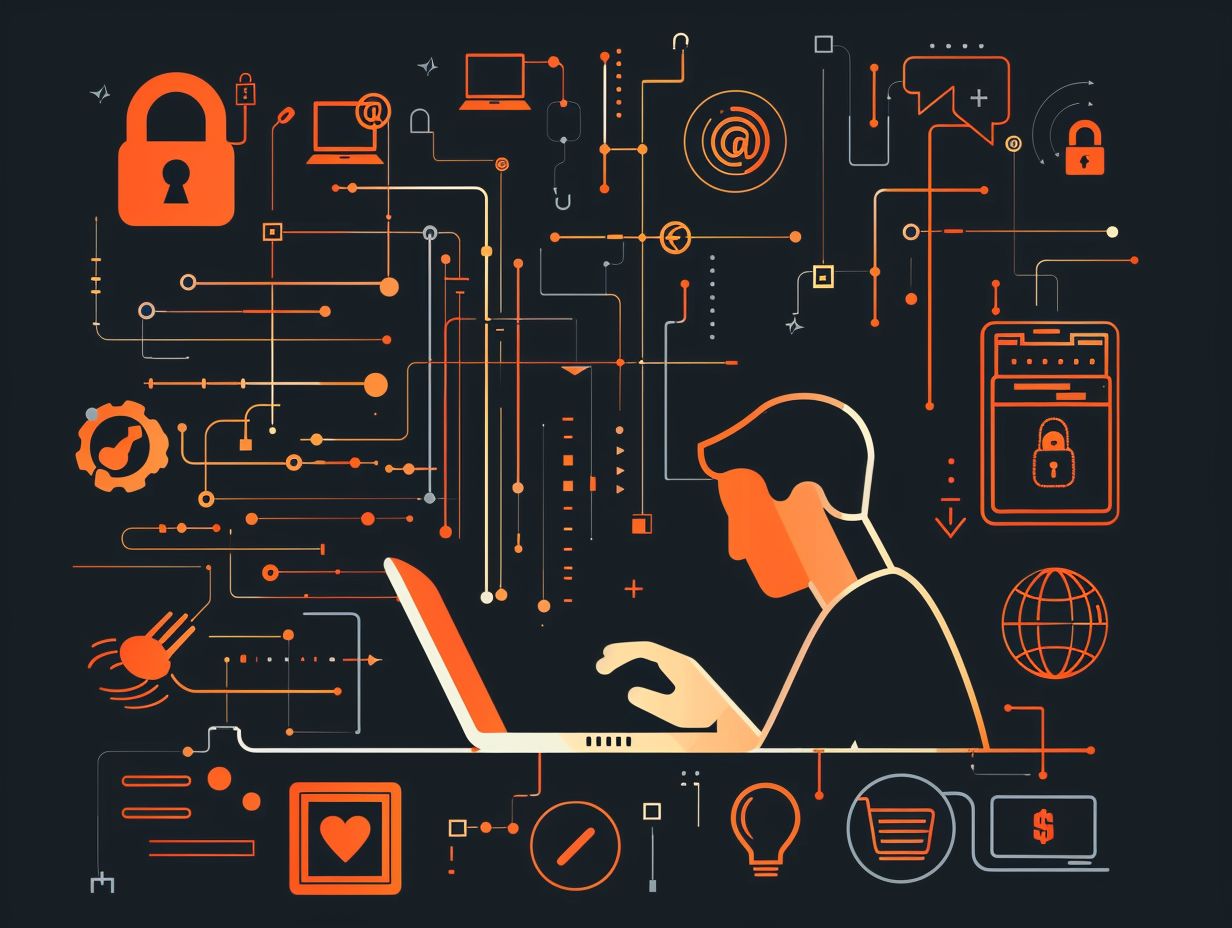If you are contemplating a career in cybersecurity and are looking for increased flexibility and autonomy, remote and freelance cybersecurity jobs may be ideal for you. This examination delves into the specifics of working remotely or as a freelancer in the cybersecurity sector. From the benefits of flexibility and work-life balance to the potential challenges and important factors to consider, we provide a comprehensive overview of what is involved in pursuing a remote or freelance career in cybersecurity. Feel free to explore further and expand your knowledge on this topic.
Key Takeaways:

- Remote and freelance cybersecurity jobs offer flexibility and work-life balance, allowing professionals to work from anywhere and manage their own schedules.
- These career options also provide opportunities for career growth and development, as professionals can take on diverse projects and gain valuable skills.
- While remote and freelance work in cybersecurity may come with challenges, such as establishing a strong online presence and networking, these can be overcome with determination and strategy.
Understanding Remote and Freelance Cybersecurity Careers
Understanding Remote and Freelance Cybersecurity Careers involves looking into the realm of cybersecurity jobs that can be performed remotely or on a freelance basis. It encompasses various roles within information security, the involvement of companies offering such opportunities, platforms like FlexJobs connecting job seekers and providers, the vital tasks undertaken by cybersecurity analysts to counter cyberattacks, and the available job listings in this technology-driven field with a focus on data analytics. Remote and freelance cybersecurity job opportunities have witnessed significant growth in recent years, reflecting the increasing importance of information security across industries. Companies across sectors are recognizing the need for robust cybersecurity measures, leading to an upsurge in demand for skilled professionals in this domain. The evolution of technology and data analytics has further shaped these careers, offering new avenues for professionals to analyze and secure sensitive information effectively. As the digital landscape continues to expand, the role of cybersecurity experts in safeguarding critical data and systems becomes increasingly vital for organizational success.
What are Remote and Freelance Cybersecurity Jobs?
Remote and Freelance Cybersecurity Jobs involve working in the cybersecurity industry from a location outside of the traditional office environment. These positions focus on ensuring the security of information through a variety of methods and platforms, with FlexJobs acting as an intermediary between individuals seeking employment and companies offering opportunities in this sector. When you work remotely in cybersecurity roles, you have the flexibility to carry out your responsibilities from various locations, giving you the freedom and independence to manage your own schedule. Freelance positions in cybersecurity typically require you to work independently, often on a project basis, allowing you to engage in diverse assignments and enhance your skill set. Maintaining information security is of utmost importance in these positions, necessitating constant vigilance and expertise to safeguard data from cyber threats and breaches. FlexJobs plays a crucial role in connecting skilled cybersecurity professionals with reputable organizations that are in need of their specialized skills and knowledge.
Benefits of Working Remotely or Freelancing in Cybersecurity
The benefits of working remotely or freelancing in cybersecurity extend beyond traditional office settings, offering you flexibility, work-life balance, and exposure to cutting-edge security solutions driven by technological advances. Companies and platforms like FlexJobs support remote work arrangements in this dynamic field. This flexibility allows professionals in cybersecurity to tailor their work hours to suit their personal schedules, resulting in improved work-life balance. Remote work also provides you with the opportunity to access a diverse range of innovative security tools and systems that are shaping the future of cybersecurity. Technological advancements in the field enable remote workers like yourself to stay on top of industry trends and continuously enhance your skills and knowledge in cybersecurity.
Flexibility and Work-Life Balance
 Flexibility and work-life balance are significant advantages of remote and freelance cybersecurity jobs, providing you with the autonomy to manage your schedule and personal commitments effectively. Companies and platforms such as FlexJobs prioritize this flexibility to facilitate a healthy integration between work and personal life. These roles in cybersecurity offer you the opportunity to customize your work hours according to your personal requirements, facilitating a better equilibrium between your professional and personal life. You have the freedom to select when and where you work, allowing you to fulfill family obligations, pursue hobbies, or allocate time for self-care. Embracing remote and freelance opportunities enables you to minimize commuting time and expenses, resulting in more time for leisure activities or personal growth. Platforms like FlexJobs play a vital role in connecting talented professionals with organizations that prioritize work-life balance, promoting a culture of trust and consideration for individual priorities.
Flexibility and work-life balance are significant advantages of remote and freelance cybersecurity jobs, providing you with the autonomy to manage your schedule and personal commitments effectively. Companies and platforms such as FlexJobs prioritize this flexibility to facilitate a healthy integration between work and personal life. These roles in cybersecurity offer you the opportunity to customize your work hours according to your personal requirements, facilitating a better equilibrium between your professional and personal life. You have the freedom to select when and where you work, allowing you to fulfill family obligations, pursue hobbies, or allocate time for self-care. Embracing remote and freelance opportunities enables you to minimize commuting time and expenses, resulting in more time for leisure activities or personal growth. Platforms like FlexJobs play a vital role in connecting talented professionals with organizations that prioritize work-life balance, promoting a culture of trust and consideration for individual priorities.
Opportunities for Career Growth and Development
In remote and freelance Cybersecurity Jobs, you are presented with vast opportunities for career growth and development in a rapidly evolving landscape. These roles offer exposure to cutting-edge technologies, data analytics, and artificial intelligence, which can enhance your skills and knowledge in this dynamic field. Professionals in these positions have the opportunity to engage with advanced security tools and systems that are essential for protecting organizations from cyber threats. By working remotely or on a freelance basis, you have the flexibility to take on diverse projects, expanding your expertise across various areas of cybersecurity. The incorporation of artificial intelligence in cybersecurity practices also presents unique learning opportunities, allowing you to stay at the forefront of innovation in the industry.
Challenges and Considerations of Remote and Freelance Work in Cybersecurity
The challenges and considerations of remote and freelance work in cybersecurity involve navigating technological complexities, combating cyberattacks, and staying updated on evolving threat intelligence. Professionals in this field face unique challenges that require proactive measures and continuous learning to ensure effective remote work practices. One of the primary issues faced by cybersecurity professionals in remote and freelance work is the lack of direct oversight. This can make it difficult to monitor and respond to potential security threats in real-time. Without physical presence in a centralized office, individuals may encounter challenges in coordinating responses and promptly detecting suspicious activities. This emphasizes the critical importance of having robust threat intelligence capabilities and leveraging advanced cybersecurity tools to effectively mitigate risks. Keeping abreast of the latest trends and tactics employed by cybercriminals is essential for proactively defending against emerging threats and vulnerabilities.
Potential Challenges and How to Overcome Them
The potential challenges you may encounter in remote and freelance work in cybersecurity center around technological vulnerabilities, persistent cyberattacks, and the critical need for advanced threat intelligence. To overcome these challenges, a proactive approach, continuous skill development, and leveraging innovative cybersecurity solutions are essential. When engaging in remote and freelance cybersecurity work, you may find it challenging to secure sensitive data across various networks without the physical presence typically found in traditional office environments. Working outside the structured IT framework of a company can present difficulties in maintaining consistent security protocols. As a freelancer, it is crucial to remain vigilant against evolving cyber threats, as your independent status may make you an attractive target for malicious actors looking to exploit potential vulnerabilities. Therefore, it is paramount to enhance your technical expertise through ongoing training and education to mitigate risks and stay ahead of cybersecurity trends.
Types of Remote and Freelance Cybersecurity Jobs
 Various types of remote and freelance cybersecurity jobs are available, spanning from positions in health information technology to the protection of computer networks. These specialized roles demand a diverse skill set and expertise in deploying security solutions to safeguard valuable data across a variety of domains. In the field of health information technology, remote cybersecurity professionals play a crucial role in guaranteeing the privacy and security of electronic medical records. Their responsibilities include establishing and upholding strong firewalls, encryption protocols, and access controls to protect patient data from unauthorized access or breaches. Conversely, professionals focused on computer network security must possess extensive knowledge of network infrastructure, threat detection, and incident response to efficiently identify and mitigate potential cyber threats.
Various types of remote and freelance cybersecurity jobs are available, spanning from positions in health information technology to the protection of computer networks. These specialized roles demand a diverse skill set and expertise in deploying security solutions to safeguard valuable data across a variety of domains. In the field of health information technology, remote cybersecurity professionals play a crucial role in guaranteeing the privacy and security of electronic medical records. Their responsibilities include establishing and upholding strong firewalls, encryption protocols, and access controls to protect patient data from unauthorized access or breaches. Conversely, professionals focused on computer network security must possess extensive knowledge of network infrastructure, threat detection, and incident response to efficiently identify and mitigate potential cyber threats.
Exploring Different Roles and Responsibilities
Exploring Different Roles and Responsibilities in Remote and Freelance Cybersecurity Jobs reveals the varied tasks associated with securing computer networks, implementing security solutions, and analyzing threat intelligence. Professionals in this field play essential roles in upholding data integrity and mitigating cybersecurity risks. You, as a professional in this field, are tasked with the continuous monitoring and evaluation of security measures to ensure the safeguarding of sensitive information and confidential data. It is crucial for you to remain up-to-date on the latest cybersecurity trends and technologies to adeptly detect and prevent potential threats. Remote and freelance cybersecurity experts collaborate with IT teams to devise and implement security protocols, conduct penetration testing, and promptly respond to any security incidents that may occur. Their contributions are critical in fortifying organizations against cyber attacks and upholding a robust defense strategy.
How to Start a Remote or Freelance Cybersecurity Career
Embarking on a Remote or Freelance Cybersecurity Career involves leveraging opportunities in cloud communications companies and utilizing web service APIs to enhance security measures. Initiating a successful career in this field requires a strategic approach, continuous learning, and adapting to the evolving landscape of cybersecurity. To excel in the realm of remote cybersecurity, you can further hone your skills by looking into specialized training courses and obtaining relevant certifications. Networking with professionals in the field and staying updated on emerging trends and technologies can provide valuable insights and opportunities for growth. Incorporating practical experience through internships or freelance projects can also help in solidifying your expertise and reputation within the industry. By actively participating in cybersecurity communities and forums, you can stay connected with like-minded professionals and access a wealth of knowledge and resources to further advance your career.
Steps to Building a Successful Career in Cybersecurity
To build a successful career in cybersecurity, you must explore opportunities in blockchain jobs, IT roles, and computer security positions, whether in traditional environments or online cybersecurity jobs. As someone aiming for a prosperous career in cybersecurity, you need to develop relevant skills, obtain certifications, and accumulate practical experience to thrive in this complex yet fulfilling field. Start by honing essential technical skills such as network security, cryptography, and ethical hacking. Enhancing your credentials with industry-specific certifications like Certified Information Systems Security Professional (CISSP) or Certified Ethical Hacker (CEH) can greatly enhance your professional profile. Acquiring hands-on experience through internships, hackathons, or bug bounty programs can equip you with invaluable practical knowledge. Embrace a mindset of continuous learning and keep abreast of the latest cybersecurity trends and technologies to establish yourself as a notable figure in the rapidly evolving cybersecurity landscape.
Frequently Asked Questions

1. What is a remote cybersecurity career option?
A remote cybersecurity career option is a job in the cybersecurity field that allows you to work from any location, without the need to be physically present in an office. This type of job typically involves using technology to secure and protect data, networks, and systems for organizations.
2. What are the benefits of working remotely in the cybersecurity field?
Working remotely in the cybersecurity field offers a range of benefits, including the flexibility to work from anywhere, the ability to set your own schedule, and the potential for a better work-life balance. It also allows you to avoid the hassle of commuting and can save you money on transportation costs.
3. Can I find freelance opportunities in the cybersecurity industry?
Yes, there are freelance opportunities in the cybersecurity industry. Many companies and organizations are looking for skilled cybersecurity professionals to work on specific projects or tasks on a freelance basis. This can be a great way to gain experience, build your portfolio, and earn additional income.
4. Are there any specific skills or qualifications required for a remote cybersecurity career?
To pursue a remote cybersecurity career, you will need to have a strong understanding of cybersecurity principles, as well as technical skills in areas such as network security, cloud computing, and data encryption. Many employers also look for certifications such as Certified Information Systems Security Professional (CISSP) or Certified Information Systems Auditor (CISA).
5. Is it possible to advance in my career while working remotely?
Yes, it is possible to advance in your career while working remotely in the cybersecurity field. Many companies offer remote positions at all levels, from entry-level to senior positions. Additionally, with the increasing demand for cybersecurity professionals, there are ample opportunities for career growth and advancement.
6. How can I find remote and freelance cybersecurity job opportunities?
There are several ways to find remote and freelance cybersecurity job opportunities. You can search for job postings on online job boards, network with professionals in the industry, and reach out to companies directly to inquire about remote positions. You can also join online communities and forums dedicated to cybersecurity to stay updated on job openings and network with potential employers.
